Using Vinegar for Cleaning Hardwood Floors Effectively
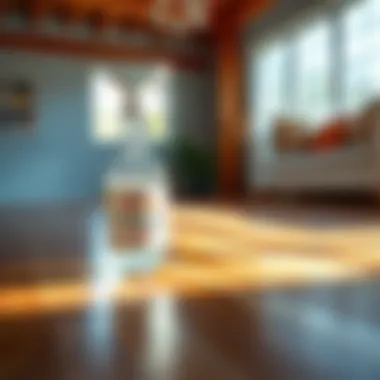
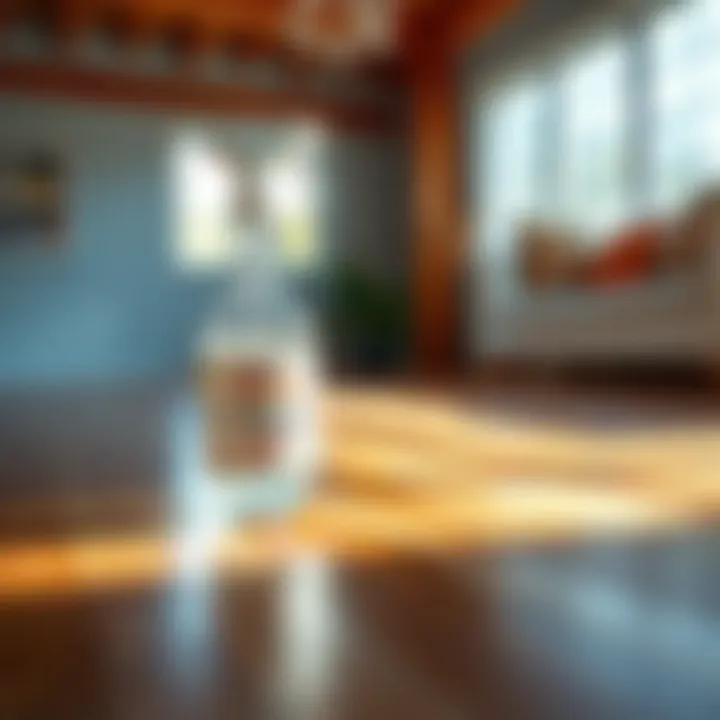
Intro
When it comes to maintaining hardwood floors, many homeowners often grapple with finding the perfect cleaning solutions. Among the myriad of products available, vinegar has emerged as a popular contender. Not only does vinegar possess cleaning prowess, but it is also gentle on the environment and easy on the wallet.
But why is this acidic liquid so effective? What makes it a go-to cleaning agent, particularly for hardwood? This article delves into the nuances of using vinegar for hardwood floor maintenance. It addresses the advantages it offers, as well as any drawbacks that may arise. By understanding the science behind vinegar, one can appreciate its value in keeping floors not just clean but also well-preserved.
With countless households turning to vinegar for its multifaceted uses, let's explore how this humble kitchen staple can transform your hardwood cleaning routine. First, we will examine some home features, emphasizing how well-maintained floors contribute to the overall ambiance and appeal of a living space.
Prologue to Cleaning Hardwood Floors
Cleaning hardwood floors is not just a chore. It’s a vital aspect of maintaining the beauty and integrity of one of the most sought-after flooring materials in homes today. Hardwood floors are prized for their elegance and durability, but they do require specific care to look their best over time. In this article, we will explore the significance of cleaning hardwood floors effectively, particularly focusing on the use of vinegar as a cleaning agent.
The importance of this topic cannot be overstated. For homeowners and renters alike, having clean and well-maintained floors can significantly enhance the aesthetic appeal of a space. Additionally, regular cleaning can extend the lifespan of hardwood, keeping repairs and replacements at bay.
Many people may think that all cleaning methods are equal, but this is far from the truth when it comes to hardwood. Traditional methods, such as using excessive water or abrasive cleaners, can easily ruin a polished surface. With this in mind, the exploration of cleansing strategies, specifically how vinegar plays a role in this process, becomes crucial. Vinegar, being a natural solution, offers an array of benefits, such as cost efficiency, non-toxic properties, and the ability to tackle common stains while preserving the wood's finish.
In summary, the discussion on cleaning hardwood floors aims to guide readers through the delicate balance of effective cleaning while maintaining the beauty of their flooring. It prepares you to understand the various methods available, alongside the specific benefits and considerations when using vinegar.
Understanding Hardwood Flooring
Hardwood flooring encompasses a range of materials made from solid wood or engineered wood products. The variety of species, finishes, and textures available means there is a style to suit every taste. Common types of hardwood include oak, maple, cherry, and hickory, each bringing its own unique charm and durability.
Understanding the nature of hardwood is essential for effective cleaning. Unlike other flooring options such as laminate or vinyl, hardwood can be sensitive to excessive moisture and harsh chemicals. The wood fibers absorb moisture, which can lead to warping and damage over time. Therefore, a gentle touch is crucial in maintaining its integrity while keeping it clean.
Common Cleaning Methods
When it comes to cleaning hardwood floors, a number of methods are frequently employed. Here are some common techniques:
- Sweeping: Regularly sweeping the floors helps remove dust and debris before they can accumulate.
- Vacuuming: Utilizing a vacuum cleaner specifically designed for hardwood floors can effectively remove dirt without scratching.
- Mopping with Water: A damp mop can be used occasionally, but it's crucial to avoid excessive water that could damage the wood.
- Commercial Cleaners: There are numerous products on the market designed for cleaning hardwood; however, not all are safe. It's important to read the labels and ensure they are suitable for your floor type.
"A stitch in time saves nine" – the old saying holds true here. Regular maintenance can prevent larger issues down the road.
By understanding these methods and their implications, you can choose the best approach that suits your needs and preserves your floors’ beauty.
Properties of Vinegar
Vinegar, a common household item, has gained considerable interest as a cleaning agent, particularly for hardwood floors. Understanding the inherent properties of vinegar is essential to harness its potential effectively. It not only offers an eco-friendly alternative to commercial cleaners but also possesses unique cleaning attributes that benefit hardwood surfaces.
Composition and Acidity
At the core of vinegar's cleaning prowess is its composition, primarily acetic acid, which typically accounts for 4% to 8% of its total content. This natural compound possesses a distinctive characteristic: it’s mildly acidic. While the thought of using something acidic on wood may raise eyebrows, the key lies in the dilution. A well-balanced solution ensures that this acidity is effective without being damaging. Vinegar works by breaking down grime and grease, which can accumulate over time, dulling the shine of your beautiful hardwood floors.
The acidity of vinegar can be further understood by considering its pH level, which hovers around 2.5 to 3.0. This level is strong enough to tackle many household stains but gentle enough to avoid causing harm to hardwood surfaces when used correctly. When combined with water, as suggested in cleaning practices, it creates a solution that safe to use while still reaping the cleaning benefits.
Natural Antimicrobial Effects
Vinegar is not just a cleaning agent; it also plays a role in hygiene due to its natural antimicrobial properties. Numerous studies indicate that acetic acid can effectively kill or inhibit the growth of various bacteria and mold, making it ideal for cleaning purposes. For households with pets or children, using vinegar can offer peace of mind as it supports a cleaner, safer environment without the harsh chemicals often found in store-bought cleaners.
When applied to hardwood floors, this antimicrobial effect can help reduce the risk of allergens and bacteria building up in cracks and crevices.
"Vinegar’s natural ability to cleanse and purify surfaces makes it an extraordinary alternative to chemical-laden cleaners, especially for maintaining hardwood floors."
Opting for vinegar can transform the janitorial process into a simpler, more effective task, merging cleaning efficiency with safety being a priority. Thus, knowing the properties of vinegar establishes a strong foundation for understanding how to use it wisely in cleaning hardwood floors.
Benefits of Using Vinegar on Hardwood Floors
Vinegar has earned its stripes in the cleaning arena, especially for hardwood floors. This section will examine why vinegar is not just a kitchen staple, but also a versatile cleaning agent. Let’s dive into the specific benefits it offers and why it stands out as a preferred choice for many.
Cost-Efficiency
Using vinegar as a cleaner brings financial relief to homeowners. Traditional cleaning products can take a hefty bite out of the budget, especially if urine stains, shoe marks, or spilled juice contribute to an ongoing cleaning saga. But with vinegar, you're looking at a cost-effective solution. A bottle of distilled vinegar costs only a fraction of commercial hardwood floor cleaners.
- Accessibility: You can find it in any grocery store, available at reasonable prices.
- Multiple Uses: Beyond just cleaning, vinegar can tackle various tasks around the home, making it a multi-tasker that streamlines your cleaning routine.
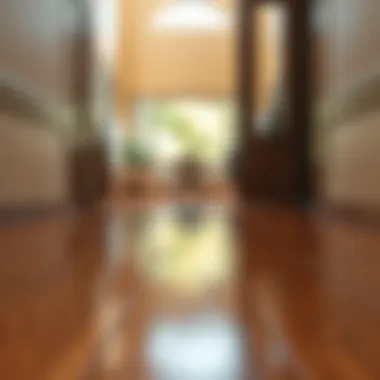
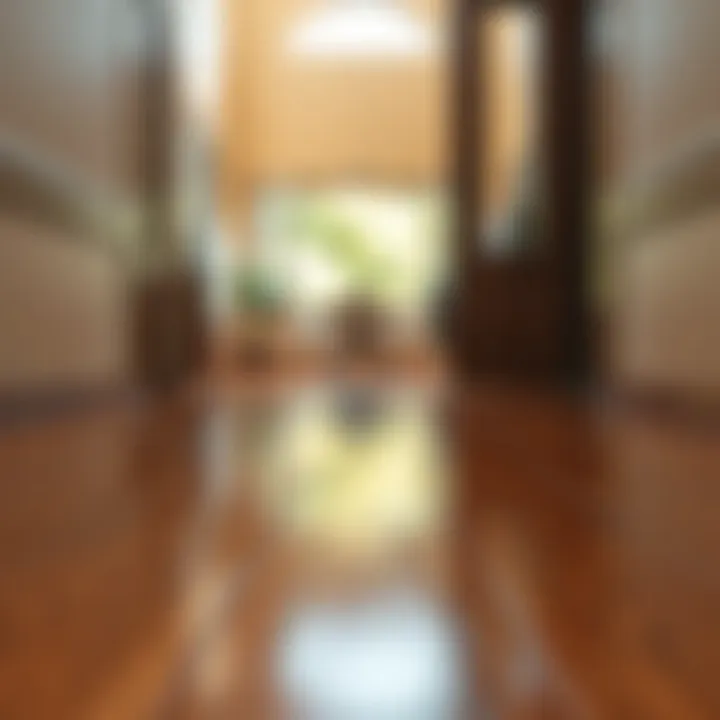
Importantly, because that little bottle serves many purposes, you're essentially getting more bang for your buck. Whether you’re looking to keep your floor’s sheen intact or simply wipe up everyday grime, vinegar's cost efficacy makes it a smart choice.
Non-Toxic Alternative
Natural cleaning solutions are becoming all the rage as people become more conscious about the chemicals they bring into their homes. Vinegar stands out as a non-toxic alternative, which is quite imperative for families, especially those with kids and pets.
Unlike many commercial products filled with harsh chemicals, vinegar is comprised primarily of acetic acid and water. This makes it safe to use without the risk of exposing loved ones to harmful substances. Additionally:
- Air Quality: Using vinegar helps maintain better indoor air quality since it doesn’t release volatile organic compounds (VOCs).
- Biodegradability: After you’re done cleaning, your vinegar solution breaks down naturally without harming the environment.
In a world where eco-consciousness is vital, vinegar allows you to clean your hardwood floors with a clear conscience.
Effective Stain Removal
Stains on hardwood floors can be a real headache, vexing even the most diligent homeowners. Vinegar proves its mettle here as well, serving as a formidable ally in stain removal.
Its acidity acts to break down stubborn dirt and grime. Perhaps you've encountered an unfortunate mishap, like a spilled glass of wine or a muddy paw print. Here, vinegar can shine:
- Targeted Treatment: For localized stains, a vinegar solution can be applied directly to the spot, enabling you to lift the stain right before your eyes.
- General Cleaning: Beyond specific stains, regular mopping with vinegar can maintain your floors, reducing the chance of dirt buildup that often leads to tougher cleaning jobs.
"A little vinegar goes a long way in ensuring hardwood floors look their best, saving both time and effort in the long run."
In summary, the benefits of using vinegar for hardwood floor cleaning are multi-faceted. It’s not just economical or safe; it’s also a potent stain remover. In the long run, embracing vinegar as a cleaning agent could very well prolong the life and aesthetic appeal of your cherished hardwood floors.
Mixing Vinegar for Cleaning
Understanding how to mix vinegar properly for cleaning is crucial when aiming to maintain the beauty and integrity of hardwood floors. The right mixture not only enhances vinegar’s natural cleaning properties but also minimizes potential damage to your flooring. This section will explore the importance of selecting the appropriate type of vinegar, determining dilution ratios, and enhancing solutions with other natural ingredients.
Choosing the Right Vinegar
When it comes to cleaning, not all vinegars are created equal. While red and wine vinegars come to mind, it’s white vinegar that takes the crown in hardwood floor cleaning. Its clear, acetic acid-based composition works best to cut through grime without leaving a residue behind. Picking high-quality, distilled white vinegar from a reputable source is advisable.
Always ensure that the vinegar you choose is free of added ingredients that might complicate its cleaning effectiveness. Simple, pure white vinegar will retain the cleaning power you need, while other blends might leave surprises that could harm your floors.
Optimal Dilution Ratios
Getting the dilution just right is key. Using vinegar straight can be like driving with one foot on the brake; it can do more harm than good. A common practice involves mixing one part vinegar with four parts water. This ratio allows the acidic properties of the vinegar to effectively break down dirt and stains while being gentle on the surface of your wood flooring.
- 1:4 Ratio - 1 cup of vinegar to 4 cups of water is a classic choice.
- 1:3 Ratio - If dealing with tougher stains, consider a 1:3 mix, providing a little extra punch without overwhelming the wood.
Always remember, the goal is to keep the solution effective but mild enough not to strip away any finish on your hardwood floors.
Enhancing Vinegar Solutions
Enhancing vinegar solutions can significantly boost their cleaning capabilities and fragrance. Here are two ways to elevate your vinegar mixture:
Adding Essential Oils
Adding essential oils, like tea tree, lavender, or eucalyptus, not only brings a pleasant scent but also adds natural antimicrobial properties to your cleaning solution. Essential oils offer benefits beyond mere fragrance; they can combat germs while you clean, offering an extra layer of protection.
- Popularity: The freshness of lavender paired with cleaning makes it a favorite.
- Advantage: They offer a safe, non-toxic way to freshen up your home while scrubbing away messes.
However, be cautious with the amount you use; a little goes a long way. Overdoing it might result in an overwhelming aroma that could linger.
Incorporating Other Natural Ingredients
Incorporating other natural ingredients—such as baking soda or Castile soap—can greatly enhance the effectiveness of your vinegar solution. Baking soda, when added, provides a gentle abrasive quality that assists in scrubbing away stubborn stains without scratching the wood surface.
- Benefit: This combination makes it easier to tackle tough dirt while remaining eco-friendly.
- Consideration: Baking soda’s alkaline nature can react with vinegar’s acidity, producing a fizz. This reaction can be useful, but mixing should be done carefully to avoid creating a mess.
Each addition offers unique advantages, but it’s important to maintain the delicate balance that ensures your hardwood floors stay in prime condition.
"The beauty of cleaning with vinegar lies not only in its simplicity but also in its effectiveness when blended thoughtfully with other natural adjuvants."
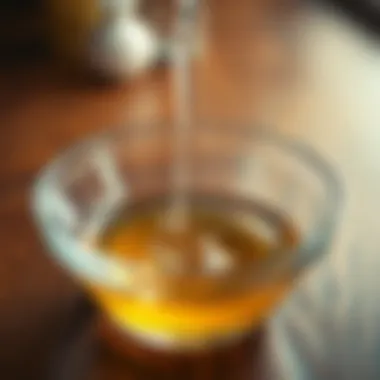
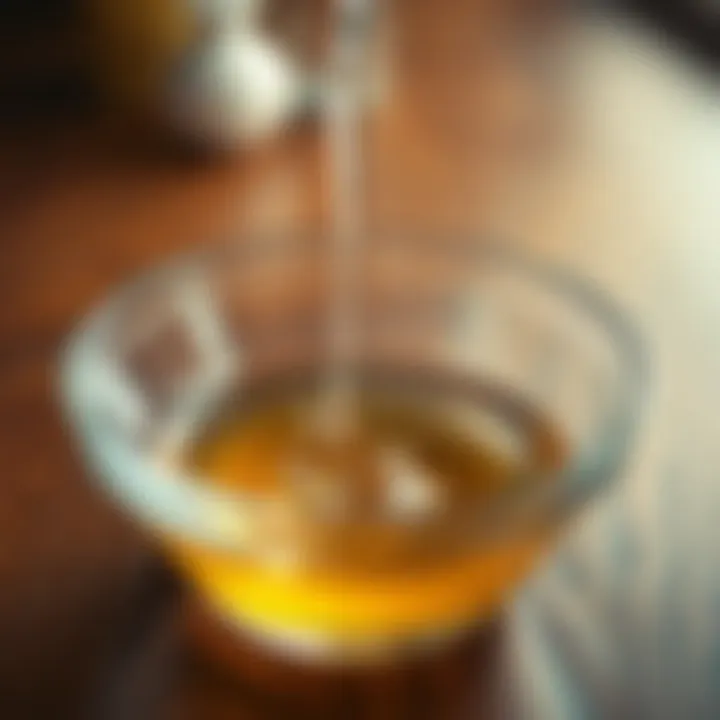
By mastering the art of mixing vinegar for cleaning, you enable yourself to wield a powerful yet gentle tool in preserving and beautifying your hardwood floors.
Application Techniques for Vinegar Cleaning
When it comes to maintaining the beauty and durability of hardwood floors, using the right application techniques for vinegar cleaning is paramount. Properly applying vinegar not only enhances its cleaning capabilities but also minimizes the risk of damaging your flooring. This section dives deep into the essentials of preparing the surface, utilizing effective tools, and following a step-by-step process that ensures optimal results beyond just surface-level cleanliness.
Preparing the Surface
Before diving into the actual cleaning process, preparing the surface is crucial. Remove all furniture, rugs, and any other objects that might obstruct your path. Sweeping or vacuuming to eliminate dirt and dust is also necessary. It may sound simple, but many folks undervalue this step. You wouldn’t want to trap dirt and debris into your cleaning solution or scratch the floor while mopping.
A clean slate not only makes cleaning easier but also allows the vinegar solution to penetrate better, thus lifting away stains more effectively. It’s like trying to paint on a wall that’s still got old hooks and cobwebs—you just won’t achieve the same crisp finish if you don’t prep it first.
Using the Correct Tools
Microfiber Mops
Microfiber mops shine as a go-to choice for vinegar cleaning. Their unique fabric is designed to attract and hold onto dirt, making them incredibly effective for sweeping away granules that could damage the floor’s finish. Not only do they clean well, but these mops are also reusable, meaning less waste and more savings in the long run.
The key characteristic of microfiber mops is their high absorbency. They can hold several times their weight in water, allowing you to clean efficiently without over-saturating the floor. However, remember to wash them gently, as harsher chemicals could wear them down.
Soft Cloths
Soft cloths are another excellent choice when it comes to cleaning hardwood with vinegar. They are gentle on surfaces and perfect for mopping up spills or applying the vinegar solution without leaving scratches. Pairing them with vinegar can be beneficial for spot cleaning stubborn stains or areas that require delicate attention.
The main advantage here is the control they offer; you can cover small areas meticulously without the risk of oversaturation that could come from larger mopping systems. But keep in mind, over time, some cloths may begin to fray, so it’s best to use fresh ones when tackling particular tough spots.
Step-by-Step Cleaning Process
This section outlines a straightforward method for using vinegar effectively on hardwood floors:
- Gather Your Supplies: Ensure you have vinegar, water, a microfiber mop or soft cloth, and a bucket for mixing.
- Mix Your Solution: In a bucket, combine equal parts of vinegar and water. For lighter cleaning, diluting the vinegar more can be beneficial, as mentioned earlier.
- Soak the Mop or Cloth: Whether using a mop or cloth, lightly soak it in the solution, ensuring it’s damp rather than soaking wet.
- Start Cleaning: Begin at one corner of the room and work your way toward the exit to avoid stepping on freshly cleaned areas. Use a back-and-forth motion, and don’t rush the process.
- Rinse with Water: After using vinegar, it’s good practice to follow up with a clean, damp mop or cloth to remove any residue.
- Dry the Floor: Finally, allow the floor to air dry or use a soft towel to blot away any excess moisture.
By following these techniques, you will not just clean your hardwood floors but also prolong their lifespan. Taking care to treat your floors respectfully leads to beautiful, enduring surfaces that enhance your space.
Potential Issues with Vinegar Use
While vinegar can be a powerhouse in the cleaning arsenal, using it on hardwood floors does come with a few considerations. These potential issues are important to be aware of to maintain your flooring's beauty and durability. Understanding how vinegar interacts with wood can help you avoid costly mistakes and promote long-lasting care for your floors.
Impact on Finish
Hardwood floors often have a finish applied to protect the wood beneath. This finish can be delicate, depending on the type used. Vinegar, being acidic, can affect certain finishes negatively. For example, it can strip away the polyurethanes or waxes that seal and protect your wood, leading to a dull appearance and uneven surfaces.
- Gloss Level: If the finish starts to deteriorate, you may find the original gloss of your flooring diminishing over time.
- Layer Removal: Continuous use of vinegar might lead to the removal of essential protective layers, making your floor more susceptible to scratches and water damage.
To mitigate these effects, it's crucial to use vinegar diluted properly and not to overdo it. A well-maintained finish prolongs the floor’s life and keeps it looking pristine.
Risk of Damage to Wood
Using vinegar on hardwood floors isn’t just about the finish; it can also pose a risk to the wood itself. If vinegar is used improperly, it could lead to damage including:
- Surface Damage: Over-saturation with vinegar solutions can cause the wood to swell or warp. This occurs when moisture seeps into the wood grain, altering its structure.
- Color Change: In some cases, vinegar can react with the wood, causing discoloration. For example, lighter woods might develop a darker hue, which can be difficult to reverse.
- Long-Term Softening: If wood is exposed to acidic substances over time, it can weaken the fibers within, impacting the overall integrity of the floor.
It’s advisable to conduct a spot test in an inconspicuous area before widespread application. This practice can help you identify any adverse reactions before they affect the entire floor.
Long-Term Effects
The long-term ramifications of regular vinegar use on hardwood floors are worth considering. Here are a few potential outcomes:
- Maintenance Costs: As you unearth issues caused by improper cleaning, future refinishing or repairs may surface. This could turn into a hit on your wallet if you need to pay for professional refinishing or replacements.
- Reduced Lifespan: Over time, the cumulative effects of vinegar can shorten the lifespan of your hardwood floor. Instead of lasting decades, the wood may wear down significantly sooner.
- Ineffective Cleaning: As the protective layers diminish, dirt and grime may become entrapped in the wood, making future cleaning less effective. A floor that was once easy to maintain may turn into a troublesome chore.
To safeguard your hardwood floors while still harnessing the natural cleaning ability of vinegar, consider alternative solutions or diluted ratios. Using vinegar sparingly and as part of a broader care strategy can help you enjoy the benefits without facing unnecessary drawbacks.
Alternatives to Vinegar for Cleaning
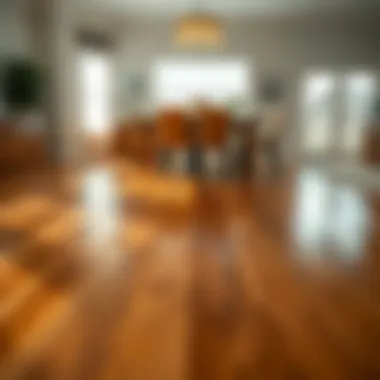
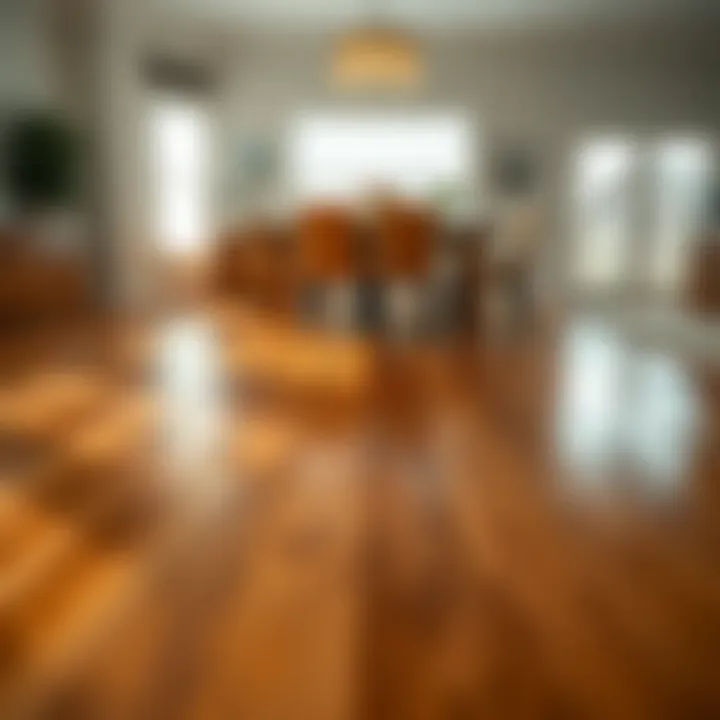
While vinegar certainly has its place in cleaning hardwood floors, it's worthwhile to explore other options that can serve as effective cleaning agents. Understanding these alternatives enables homeowners or cleaning enthusiasts to make informed choices. It’s not just about cleaning effectively; it’s about preserving the integrity of your cherished hardwood surfaces and ensuring they age gracefully.
Commercial Cleaners
In the realm of commercial cleaners, a plethora of products are tailored specifically for hardwood floors. These formulations often take into account the needs of the wood, combining various cleaning agents designed to lift grime without damaging the finish. Notably, many of these cleaners include ingredients like plant-based surfactants and gentle solvents. They offer convenience and peace of mind with clear labeling about their suitability for hardwood.
A significant advantage of commercial cleaners is their ease of use. Just spray, wipe, and you're done. Brands such as Bona or Murphys provide reliable options that are wood-safe and prolong the life of your floors. However, be cautious; not every product is created equal. Some may contain harmful chemicals or strong fragrances that can irritate allergies or respiratory issues. It’s always a good idea to scrutinize the ingredients list before purchase.
Home Remedies
One thing that many people find appealing about home remedies is their cost-effectiveness and availability. Often, the ingredients for these solutions are already tucked away in your pantry. While vinegar is one option, here are two other home remedies that strike a chord with practicality and efficiency.
Baking Soda Solutions
Baking soda is a household staple known for its myriad uses, not just in the kitchen but also for cleaning. When it comes to hardwood floors, it acts as a gentle abrasive, helping to lift stains without scratching the surface. This is its key characteristic; it cleans while being safe—essential for maintaining floor finishes.
One effective method with baking soda is to make a paste with water. This paste can be applied directly to spot stains, and after a short time, wiped away with a soft cloth. The unique feature here is that it doesn’t just mask odors; it helps neutralize them at the source, benefiting overall air quality in your home.
However, while it is beneficial, overuse can leave a fine residue on the floor, so moderation is the name of the game.
Castile Soap
Another contender from the realm of home remedies is Castile soap, made from vegetable oils. This natural soap is not only biodegradable but also quite versatile. Its key characteristic is its gentleness; you can use it on various surfaces without worrying about harsh chemicals. For hardwood floors, a simple solution of Castile soap and water can refresh your floors beautifully.
What's unique about Castile soap is its capacity to emulsify dirt and grease, making cleaning simpler. To use it effectively, just dilute a few drops in warm water and mop away. The main advantage of using Castile soap is its non-toxic nature, making it a popular choice for families with pets or young children. However, it can leave a slippery residue if not rinsed adequately, so care in application is crucial.
In summary, while vinegar has its attributes, awareness of these alternatives allows us to consider varying scenarios and preferences. Whether opting for a reliable commercial cleaner or eyeing the pantry for home remedies, the options remain vast. Each has its own advantages and potential downsides, so choosing the right one can lead to beautifully maintained hardwood floors without any fuss.
Regular Maintenance Tips for Hardwood Floors
Maintaining hardwood floors isn't merely about a deep clean every now and then; it's about a sustainable approach that ensures longevity, aesthetics, and functionality. Regular maintenance isn’t just beneficial, it’s essential for keeping those elegant wooden surfaces looking their best and resisting wear and tear.
Dust and Dirt Management
Dust and dirt can be the nemesis of hardwood floors. Every time you walk across the floor, tiny particles can scratch the surface, and over time, these scratches accumulate, dulling the floor's shine. So, what's the best way to manage this? Well, frequent sweeping or vacuuming is a must. Use a soft-bristle broom or a vacuum with a wood floor attachment to gather up dirt without causing damage. This simple habit can prevent a plethora of issues later on.
Additionally, consider implementing a cleaning schedule. Such a schedule doesn’t have to be rigid—all it needs is a specific timeframe. Whether it’s once a week or bi-weekly, consistency reigns supreme when it comes to dust management. The more proactive you are, the less buildup will occur, helping your floors maintain their luster.
Appropriate Footwear and Rugs
It might sound trivial, but the type of footwear you and your guests bring into your home can greatly affect your hardwood floors. High heels and hard-soled shoes? A recipe for scratches. Encouraging a house rule of soft slippers or socked feet can do wonders to reduce wear.
Moreover, placing rugs or mats at entryways isn't just to make things look pretty—it’s a practical solution. These items act as barriers that capture dirt and moisture before they reach your beautiful hardwood. Just make sure these rugs have a non-slip backing; otherwise, you might be risking tripping hazards.
Protective Measures to Consider
Taking those extra steps to provide your hardwood floors with protection can go a long way. Furniture pads are often overlooked but vital for safeguarding against scratches that can occur when moving furniture around. Adhesive felt pads can be easily attached to table legs and chair feet, providing a soft buffer against your floors.
Moreover, consider using mats under high-traffic areas like dining rooms or living spaces. Heavy appliances, especially those on wheels, can easily damage hardwood if not managed properly. Preventing damage is far easier than remedying it, and implementing these protective measures is a sound investment in the longevity of your floors.
"An ounce of prevention is worth a pound of cure." Taking care of your hardwood through regular maintenance and smart protective measures not only saves future headaches but enhances the overall beauty of your living spaces.
In sum, while vinegar might carry out the heavy lifting of cleaning now and again, it’s these constant maintenance tactics that keep your hardwood floors thriving. Consistency, awareness, and a little bit of elbow grease can ensure that your hardwood remains a centerpiece of your home for years to come.
Finale
Cleaning hardwood floors can raise a lot of questions, especially when it comes to the best methods to preserve their beauty and durability. Vinegar often comes to mind as a natural alternative in this pursuit. Its role as a potent yet gentle cleaning agent deserves thoughtful consideration, especially for those who prioritize maintaining their flooring’s aesthetic while minimizing environmental impact.
Summary of Key Points
To recap, vinegar is lauded for its many benefits in hardwood floor maintenance. Some key points include:
- Cost-Effectiveness: Vinegar is generally cheaper than commercial cleaners and can often be found in most kitchens. This makes it a budget-friendly option for many households.
- Non-Toxic Nature: Unlike harsh, chemical-laden cleaners, vinegar presents a safer choice for families with children and pets. It ensures that your cleaning routine does not compromise your family’s health or the environment.
- Stain Removal Efficiency: Stains from spills, dirt, and foot traffic can wreak havoc on hardwood flooring. Vinegar’s ability to tackle these stains effectively without damaging the wood makes it particularly appealing.
In addition to its cleaning prowess, vinegar is celebrated for its natural antibacterial properties, proving itself as an overall effective agent for hygiene.
Final Considerations on Vinegar Usage
While vinegar holds many advantages, caution cannot be taken lightly. Overuse or incorrect dilution can lead to an adverse effect on the flooring finish. For instance, it’s prudent to always test a small area first before proceeding with a full clean. Always dilute vinegar with water to ensure safe application; a good starting point is a mixture of one part vinegar to three parts water.
Moreover, different finishes may react differently to vinegar. Oil-based finishes, for example, might fare better than polyurethane ones. Therefore, understanding the particular finish of your hardwood is crucial in deciding whether or not to use vinegar.



